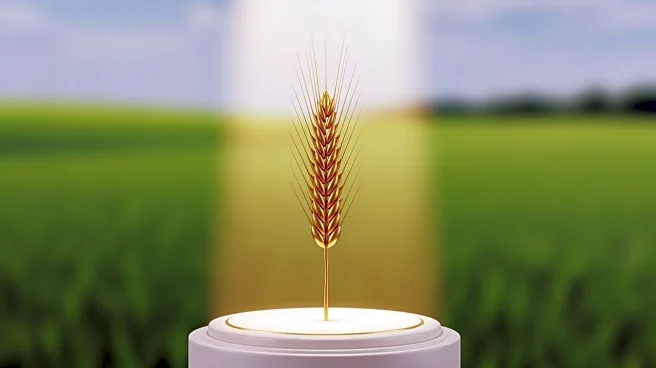What's Happening?
Brazilian microbiologist Mariangela Hungria has been awarded the $500,000 World Food Prize for her pioneering work in sustainable agriculture. Hungria's research focuses on developing biological seed and
soil treatments that reduce the need for synthetic fertilizers, thereby increasing crop yields and reducing environmental impact. Her innovations have significantly benefited Brazilian farmers, saving them an estimated $25 billion annually and preventing 230 million metric tons of CO2 equivalent emissions. The award ceremony took place at the Community Choice Event Center in Des Moines, attended by notable figures such as Iowa Governor Kim Reynolds and World Food Prize Foundation CEO Tom Vilsack.
Why It's Important?
Hungria's work represents a significant advancement in sustainable agriculture, offering a viable alternative to chemical fertilizers. This development is crucial for reducing agriculture's environmental footprint and enhancing food security. By promoting the use of naturally occurring bacteria to provide nutrients to plants, Hungria's innovations help cut costs for farmers and reduce greenhouse gas emissions. Her contributions align with global efforts to combat climate change and promote sustainable farming practices. The recognition of her work also highlights the critical role of women in science and agriculture, encouraging more inclusive participation in these fields.
What's Next?
The adoption of Hungria's biological treatments is expected to continue expanding beyond Brazil, potentially transforming agricultural practices worldwide. As more farmers seek sustainable solutions, the demand for such innovations is likely to grow. This could lead to further research and development in the field of soil microbiology, fostering new collaborations between scientists, governments, and industry stakeholders. Additionally, Hungria's recognition may inspire other women in science to pursue similar paths, contributing to a more diverse and innovative agricultural sector.
Beyond the Headlines
Hungria's achievements underscore the importance of recognizing and supporting women's contributions to agriculture and science. Historically, women's roles in these fields have been underappreciated, but Hungria's success demonstrates their potential to lead transformative changes. Her work also raises ethical considerations about the balance between technological advancements and environmental stewardship, prompting discussions on how to best integrate sustainable practices into mainstream agriculture.









